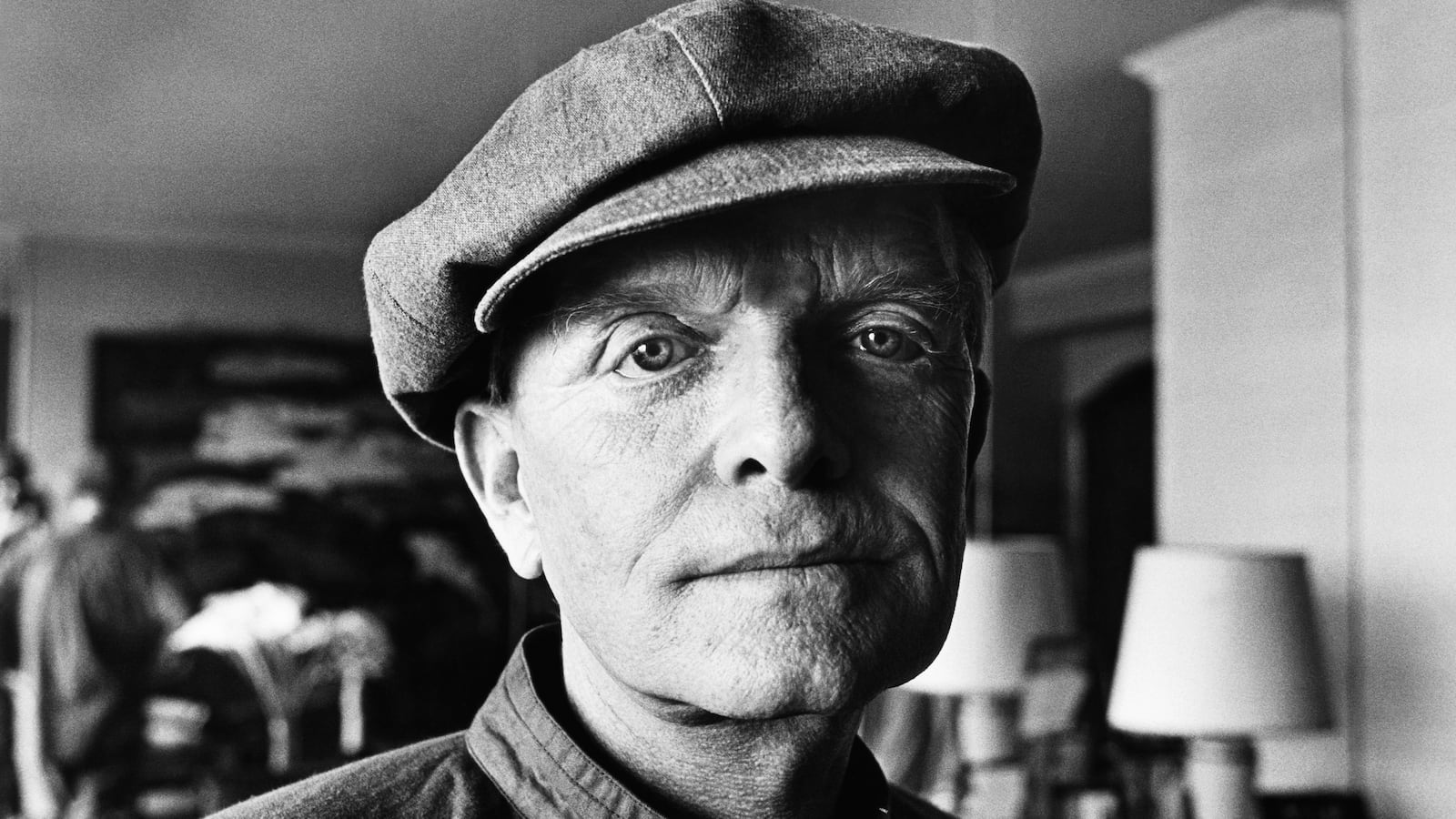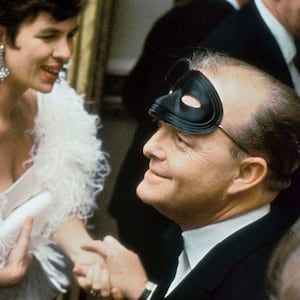Joanne Carson had Truman’s remains taken to the Grand View Memorial Park in Glendale for cremation. She said he had given her written instructions to divide his ashes in two, half to remain in Los Angeles, half to be in New York. It was an unlikely story. She told no one but had the funeral home put the ashes in two urns.
When Joanne gave Jack Dunphy a brass urn that looked like a book and had Truman’s initials on it, he thought he had all of his lover’s ashes. He had no idea there was a second, simpler urn without initials that Joanne was keeping for herself. When Jack learned what Joanne had done, he never talked to her again.
In the immediate aftermath of Truman’s death, there was all kinds of speculation about Answered Prayers. Joanne said that Truman had finished the book and hidden it away in a safety-deposit box to be discovered later. She had what she said was the key, though she had no idea where the box was located. Joanne gave the key to Truman’s literary executor, Alan Schwartz, who tried unsuccessfully to locate it. It was a beautiful story to think Truman’s masterpiece was lying there somewhere and would one day reappear, validating everything he had been saying all these years.
Others close to Truman did not believe Joanne. Jack had spent more time with Truman than anyone and saw how for so long he had deceived people about writing Answered Prayers. Jack was convinced that no manuscript existed. Truman’s longtime editor, Joe Fox, speculated that there were perhaps some chapters out there, but not the finished novel Truman had been promising for so long.
Joanne turned her sprawling house above Sunset Boulevard into a shrine for Truman. At the auction of Truman’s belongings, she focused on buying not just major pieces but plates, bowls, and all kinds of knickknacks that only she knew had been Truman’s. She placed them all around her house. She kept his bedroom behind the kitchen the way it had been when he was alive.
Joanne said that shortly before Truman died, she taped him telling her how to do the Los Angeles eighties counterpart of his famous Black and White Ball. For Halloween in 1988, Joanne decided to give what she was convinced would be the party of the decade. With Truman’s recorded guidance, she felt it was impossible to fail.
That evening, her driveway was full of about thirty wildly unhappy paparazzi and entertainment reporters. Joanne had sent her invitations out to the movie kingdom elite, but no celebrity worth his star on Hollywood Boulevard was going to attend a party hosted by Johnny Carson’s ex and then risk never again being invited to appear on The Tonight Show. The entertainment journalists were having a miserable evening standing there with no celebrities to interview or photograph.
Inside were all these empty tables around the swimming pool, all this uneaten food and unopened wine bottles. Practically the only stars were a senile Mr. Magoo, Jim Backus, sitting propped up on the sofa, and Esther Williams, almost unrecognizable from her days as the queen of swimsuit epics. A reporter and photographer from People were there, but it was clear they weren’t going to chronicle this disaster.
At midnight, the guests were supposed to remove their masks. Soon after that, Joanne came running out of the kitchen. “There’s been a theft,” she yelled. “From Truman’s room they’ve taken jewelry, his last manuscript, and his ashes, my God, they’ve taken Truman’s ashes.” If there had been such a robbery, it would have been expected Joanne would call the police, but she did not do that. Desperate to be featured in People, she doubtlessly made the whole thing up.
The purported theft was a People magazine story if there ever was one, made even more dramatic by what Joanne told the weekly happened a few days later: “Under cover of darkness, a mysterious car had screeched in and out of Carson’s driveway, and when the trembling Joanne looked outside, she found Truman’s mortal remains resting inside a coil of garden hose on her back steps.”
Joanne felt she could not risk having Truman’s ashes in her house any longer, and she had to do something. On a morning in early November 1988, she was wearing a warm-up suit and sneakers and looked positively sportif as she decided she must take dramatic action. Carrying Truman’s ashes, Joanne drove down to Sunset Boulevard in her Mazda RX-7, darting in and out of the traffic as if she had an urgent destination.
“Oh, Truman, Truman, what are we going to do?” Joanne asked, looking over at the urn. “Where do you want to be?”
As Joanne carried on an animated conversation with the late Truman, she became more and more overwrought. Eventually, she decided to take the urn to the Westwood Village Memorial Park, a few miles east of her house. It did not look like a mortuary and cemetery but more like a place for a new age seminar.
As soon as Joanne entered the main building, a dark-suited representative greeted her. In LA, even morticians are obsessed with celebrity. The man was obviously impressed that he was dealing with two famous people that morning: Truman Capote and Johnny Carson’s ex-wife.
The gentleman was extremely solicitous of Joanne. “Oh, Mrs. Carson, I’m so sorry about your accident,” he said.
“My accident?” Joanne asked.
“Yes,” he said, pointing to a piece of tape that ran down her forehead.
“Oh, that,” Joanne said, “that’s to prevent wrinkles.”
The representative took her to what appeared to be rows of mailbox slots. Joanne could scarcely envision leaving Truman there, and she moved on. The man opened a door to what appeared to be a library. “Oh, that’s so poetic, marvelous,” Joanne said. “But Truman, why, he’s one of the greatest writers of the age, how can he be a book between other books that aren’t writers?” She had a point, and they moved on up the pathway to a grand marble wall that housed crypts.
“Oh, my goodness, there’s Marilyn Monroe,” Joanne said. “This is where you belong, Truman.”
As Joanne stood looking up, the representative said, “Mrs. Carson, I’m afraid they’re all taken.”
“Oh, that’s terrible, terrible.”
“But you see that one there,” the man said. “That’s Mr. Peter Lawford.”
“Oh, yes,” Joanne said, looking at the crypt containing the ashes of the actor who had been married to JFK’s sister Patricia Kennedy.
“Well, the Kennedys haven’t paid, and we would be willing to cut a special deal with you and remove Mr. Lawford.”
Joanne knew a bargain when she saw one, but she could not bear to part with her share of Truman. Back at her house, after pouring out half the ashes into a separate urn, she added her late dog’s ashes. Then she returned to Westwood Village Memorial Park to have the urn sealed in the crypt. As for Lawford’s ashes, they were cast out on the ocean, a considerable savings from the price of a crypt.
For the rest of her life, Joanne kept that remaining share of the ashes in a carved Japanese box on her mantelpiece. After her death in 2015, Joanne’s estate auctioned off Truman’s ashes—or, more accurately, a quarter of Truman’s ashes. The Julien’s auction house had certain qualms about putting the ashes up for sale, but when they thought of how the highly regarded Christie’s had auctioned Napoleon’s penis off in 1977 for $3,000, they felt better about the idea. Perhaps using Napoleon’s penis as a benchmark, they estimated the ashes would sell for between $4,000 and $6,000. Instead, they went for an astronomical $45,000. As for Joanne’s ashes, they were placed in the crypt next to the other quarter of Truman’s ashes, where they remain today.
What a marvelous set piece Truman would have made of this tale. Nothing in life was too bizarre for his scrutiny. If he was sitting over dinner with his swans, he would have regaled them with this business, spinning it out in all kinds of ways. Napoleon’s was not the best penis he would have ever seen—Time described it as looking like “a maltreated strip of buckskin shoelace”—but it had once been attached to the invader of Russia and ruler of half of Europe. And a quarter of Truman’s ashes had gone for fifteen times the price.
Truman understood the myriad ironies of his life better than anyone. He had written two books that will live, In Cold Blood and Breakfast at Tiffany’s, but he had not finished his self-described masterpiece, Answered Prayers.
Brilliant of mind, merciless in ambition, shrewd in social relations, Truman believed that he could enter the swans’ domain and leave with a chef d’oeuvre in his hand. But he got all tangled up in the swans’ world and in his own personal demons. In the end, Answered Prayers proved to be as much Truman’s story as it was the swans’.
People bid for Truman’s presence in death, and bid royally, just as they had in life. As long as people read Truman’s books, talk about him, and fight over some measure of his presence, he is still alive, beguiling the world with his stories.
From CAPOTE’S WOMEN: A True Story of Love, Betrayal, and a Swan Song for an Era by Laurence Leamer, published by G. P. Putnam's Sons, an imprint of Penguin Publishing Group, a division of Penguin Random House, LLC. Copyright © 2021 by Laurence Leamer.







